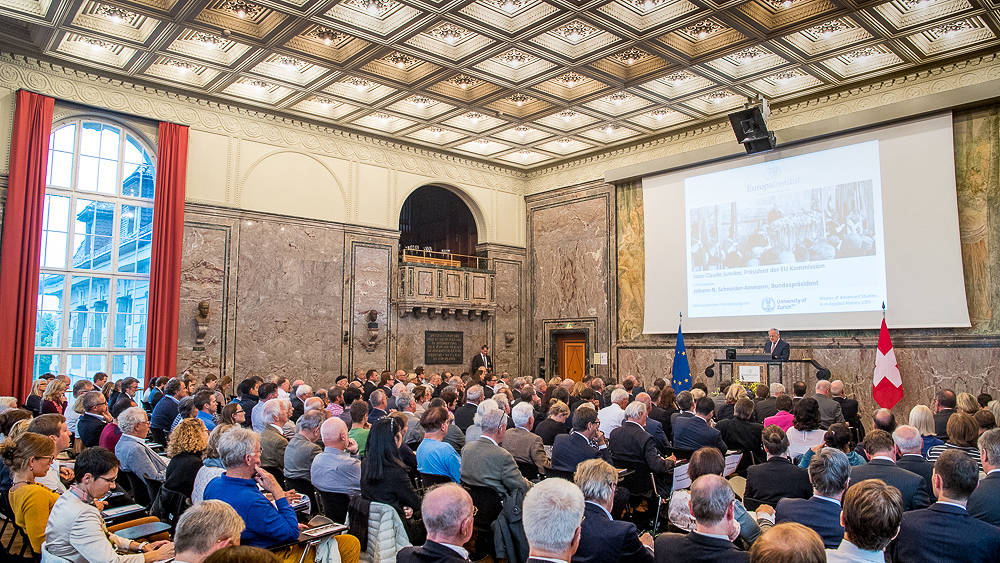Navigation auf uzh.ch
Navigation auf uzh.ch

On 19 September 1946, in the very same lecture hall, Winston Churchill called for reconciliation among the countries of Europe – and the world listened. “The University of Zurich is proud to have played a part in that historic moment,” said UZH President Michael Hengartner in his welcome address.
The festivities marking the 70th anniversary of the legendary speech were dominated by the topic of relations between Switzerland and the EU, described by Hengartner as being “of urgent importance” for UZH. He said that science and research relied on exchange and international cooperation, calling for the Swiss and EU commission presidents to give their assurance that close cross-border research partnerships in Europe would continue.
Swiss president Schneider-Amman picked up the ball in his speech. “Europe can’t afford to allow rifts to arise in science,” he said. “We have to join forces.” He said that it was important for the whole of Europe for Switzerland to be able to take part in the Horizon 2020 framework program on a fully integrated basis from next year on; this in turn hinges on signature of the Croatia protocol. “It’s in our hands,” said Schneider-Amman, adding, to great applause: “Let’s do it.”
Referring to his earlier talk with Jean-Claude Juncker, the Swiss president said that Switzerland had got a step closer to the “goal of managing immigration while at the same time pursuing the bilateral approach. “We will continue to work on a good, amicable solution, because this is preferable to unilateral action.”
Schneider-Ammann called for close, equal partnership between Switzerland and Europe, saying that this was in the interests of both sides: “A strong Switzerland is good for Europe, and Switzerland for its part needs a strong, stable, and flourishing Europe.” When top EU politicians are diagnosing an existential crisis for Europe, he said, it’s not good news for Switzerland either.
Let’s not miss the boat
With reference to the current state of Europe, Schneider-Ammann had this to say: “We need the confidence and belief in the future urged by Winston Churchill in this very lecture hall seventy years ago.” Europe, he said, is confronted with great challenges – not only the refugee and debt crises currently setting the agenda. Europe has to make sure it doesn’t miss the boat in terms of technological development. According to the Swiss president, a “European renaissance” is necessary. The technology giants of the future should no longer be confined to Silicon Valley, but should also be found “in London, Berlin, Paris, and of course Switzerland – in Zurich, or in the nascent innovation park in Dübendorf.” Besides innovatory power, the ability to collaborate across borders is crucial.
In his speech Jean-Claude Juncker was at pains to correct the fairly unflattering picture that currently dominates public perceptions of Europe. “Europe’s not like it says in the papers,” he said. It’s not a project of the elites – it’s a project of the people. He said you have to get geographic distance to see what the continent is really about, pointing out that beyond Europe, European post-war history is seen as an unparalleled success.
Juncker called for a sense of proportion when it comes to judging Europe, warning against both European euphoria and exaggerated pessimism. While he pleaded for modesty, he also rejected merely badmouthing Europe on the basis of the many problems the EU faces. He went on to describe the achievements of the EU: it has preserved the peace for decades, provided a fertile environment for numerous young democracies to prosper, created the largest single market in the world, and thanks to its common currency has prevented a foreign exchange war between individual countries.
A place of hope
According to Juncker, many people all over the world see Europe as a place of hope. To make sure it stays this way, however, change will be needed. Like the Swiss president before him, the EU commission president spoke of the pressing need to boost Europe’s powers of innovation. Europe, he said, must put itself back at the cutting edge of technological development. It will also have to reduce the bureaucracy, and avoid the temptation of “sticking its nose into every single detail.”
“We don’t need more Europe. We need a better Europe,” was how Juncker summed up his ideas. Europe mustn’t allow itself to develop into a uniform, centralized state; it has to respect the unique characteristics of different countries and regions.
On the other hand, Juncker dismissed petty regionalism, which he said was “no recipe for the future.” Only together can the countries of Europe assert their interests in a world where its relative demographic weight is dwindling.
As for negotiations with the United Kingdom, only due to commence once a formal application to leave is submitted, Juncker held out the prospect of a “fair deal.” Without explicitly mentioning Switzerland in this connection, he once more made clear in his speech that full access to the single market could only be granted to countries that abided by the agreed rules.
Juncker reiterated this position in the subsequent round of questions. He said that from the EU’s point of view there was no question of revoking the bilateral accords with Switzerland, and that if Switzerland continues to respect the rules of the European single market, it would remain part of this market. Juncker was confident that the will of the Swiss people could be reconciled with these basic rules.